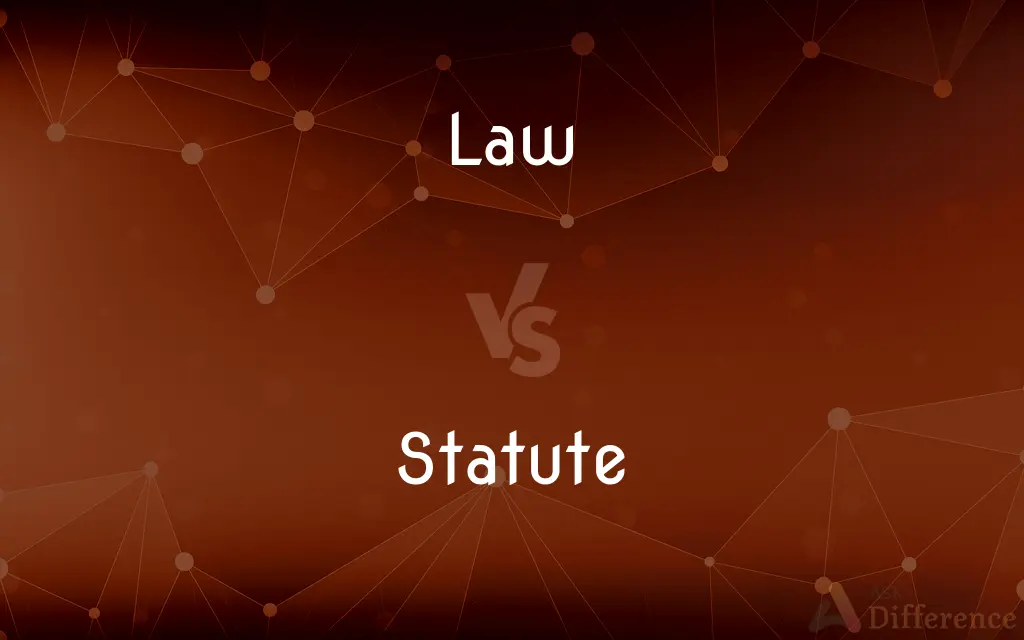Law vs. Statute — What's the Difference?
By Tayyaba Rehman — Updated on October 30, 2023
Law is a system of rules governing a society, while a statute is a specific written law formally enacted by a legislative body.

Difference Between Law and Statute
Table of Contents
ADVERTISEMENT
Key Differences
Law encompasses the entire system of rules and principles that govern a society, aimed at maintaining order and justice. Statutes, on the other hand, are specific written laws that have been formally enacted by a legislative authority. While laws represent the broader legal framework, statutes are individual components within that framework.
The concept of law is more abstract and can include various types of norms, such as common law, constitutional law, and statutory law. A statute is a concrete expression of law, typically passed by a government's legislative branch, addressing specific issues or situations. Therefore, all statutes are laws, but not all laws are statutes.
Laws can be created through various processes, including judicial decisions (common law) and executive actions. Statutes, in contrast, are exclusively products of legislative action and are often codified in legal codes. This difference highlights the diverse origins of laws versus the specific procedural genesis of statutes.
The scope of law is vast and can encompass everything from international agreements to local ordinances. Statutes have a narrower focus, typically addressing specific legal issues, providing regulations, or establishing organizations. This distinction showcases the broad reach of law compared to the more targeted nature of statutes.
In enforcing and interpreting the law, courts consider various sources, including statutes, precedents, and legal principles. When interpreting a statute, however, courts focus on the text of the statute itself, its legislative history, and the intent of the lawmakers. This delineates the broader interpretive context for law versus the focused analysis for statutes.
ADVERTISEMENT
Comparison Chart
Definition
A system of rules governing a society
A specific written law enacted by a legislature
Scope
Broad, includes various norms
Narrow, addresses specific issues
Origin
Various sources, including judiciary
Exclusively from legislative action
Focus
General framework of governance
Specific regulations or provisions
Interpretation
Diverse sources considered
Focus on text and legislative intent
Compare with Definitions
Law
A system of rules established by a society to maintain order.
The law requires everyone to pay taxes.
Statute
A formal decree or enactment by a legislative authority.
The statute was signed into law last week.
Law
A rule derived from legislation or custom in a community.
Breaking the speed limit is against the law.
Statute
A written law passed by a legislative body.
The statute prohibits smoking in public places.
Law
A principle based on predictable consequences of an act.
Newton's law of motion explains how objects move.
Statute
A codified rule or regulation under a legal system.
The company violated a federal statute.
Law
Law is a system of rules created and enforced through social or governmental institutions to regulate behavior, with its precise definition a matter of longstanding debate. It has been variously described as a science and the art of justice.
Statute
A legislative act addressing specific issues.
A new environmental statute was passed.
Law
A rule of conduct or procedure established by custom, agreement, or authority.
Statute
A document expressing a legislative decision.
The city council passed a statute regulating noise levels.
Law
The body of rules and principles governing the affairs of a community and enforced by a political authority; a legal system
International law.
Statute
A statute is a formal written enactment of a legislative authority that governs the legal entities of a city, state, or country by way of consent. Typically, statutes command or prohibit something, or declare policy.
Law
The condition of social order and justice created by adherence to such a system
A breakdown of law and civilized behavior.
Statute
A law enacted by a legislature.
Law
A set of rules or principles dealing with a specific area of a legal system
Tax law.
Criminal law.
Statute
A decree or edict, as of a ruler.
Law
A statute, ordinance, or other rule enacted by a legislature.
Statute
Written law, as laid down by the legislature.
Law
A judicially established legal requirement; a precedent.
Statute
An act of a corporation or of its founder, intended as a permanent rule or law; as, the statutes of a university.
Law
The system of judicial administration giving effect to the laws of a community
All citizens are equal before the law.
Statute
An assemblage of farming servants (held possibly by statute) for the purpose of being hired; - called also statute fair.
Law
Legal action or proceedings; litigation
Submit a dispute to law.
Statute
An act passed by a legislative body
Law
An impromptu or extralegal system of justice substituted for established judicial procedure
Frontier law.
Statute
Enacted by a legislative body;
Statute law
Codified written laws
Law
An agency or agent responsible for enforcing the law. Often used with the
"The law ... stormed out of the woods as the vessel was being relieved of her cargo" (Sid Moody).
Law
(Informal) A police officer. Often used with the.
Law
The science and study of law; jurisprudence.
Law
Knowledge of law.
Law
The profession of an attorney.
Law
Something, such as an order or a dictum, having absolute or unquestioned authority
The commander's word was law.
Law
A body of principles or precepts held to express the divine will, especially as revealed in the Bible.
Law
The first five books of the Hebrew Scriptures.
Law
A code of principles based on morality, conscience, or nature.
Law
A rule or custom generally established in a particular domain
The unwritten laws of good sportsmanship.
Law
A way of life
The law of the jungle.
Law
A statement describing a relationship observed to be invariable between or among phenomena for all cases in which the specified conditions are met
The law of gravity.
Law
A generalization based on consistent experience or results
The law of supply and demand.
Law
(Mathematics) A general principle or rule that is assumed or that has been proven to hold between expressions.
Law
A principle of organization, procedure, or technique
The laws of grammar.
The laws of visual perspective.
Law
(usually with "the") The body of binding rules and regulations, customs, and standards established in a community by its legislative and judicial authorities.
The courts interpret the law but should not make it.
In theory, entrapment is against the law.
Law
The body of such rules that pertain to a particular topic.
Property law
Commercial hunting and fishing law
Law
Common law, as contrasted with equity.
Law
A binding regulation or custom established in a community in this way.
There is a law against importing wallabies.
A new law forbids driving on that road.
The court ruled that the executive order was not law and nullified it.
Law
(more generally) A rule, such as:
Law
Any rule that must or should be obeyed, concerning behaviours and their consequences. mores.}}
"Do unto others as you wish them to do unto you" is a good law to follow.
The law of self-preservation
Law
A rule or principle regarding the construction of language or art.
The laws of playwriting and poetry
Law
A statement (in physics, etc) of an (observed, established) order or sequence or relationship of phenomena which is invariable under certain conditions. theory.}}
The laws of thermodynamics
Newton's third law of motion states that to every action there is always an equal and opposite reaction.
This is one of several laws derived from his general theory expounded in the Philosophiæ Naturalis Principia Mathematica.
Law
A statement (of relation) that is true under specified conditions; a mathematical or logical rule.
Mathematical laws can be proved purely through mathematics, without scientific experimentation.
Law
Any statement of the relation of acts and conditions to their consequences.
The law of scarcity
The law of supply and demand
Law
(linguistics) A sound law; a regular change in the pronunciation of a language.
Grimm's law
Dahl's law
Law
(cricket) One of the official rules of cricket as codified by the its (former) governing body, the MCC.
Law
The control and order brought about by the observance of such rules.
They worked to maintain law and order.
It was a territory without law, marked by violence.
Law
(informal) A person or group that act(s) with authority to uphold such rules and order (for example, one or more police officers).
Here comes the law — run!
Then the law arrived on the scene
Law
The profession that deals with such rules (as lawyers, judges, police officers, etc).
He is studying for a career in law.
She has practiced law in New York for twenty years.
Law
Jurisprudence, the field of knowledge which encompasses these rules.
She went to university to study law.
Law
Litigation; legal action (as a means of maintaining or restoring order, redressing wrongs, etc).
They were quick to go to law.
Law
An allowance of distance or time (a head start) given to a weaker (human or animal) competitor in a race, to make the race more fair.
Law
(aviation) A mode of operation of the flight controls of a fly-by-wire aircraft.
Normal law; alternate law; direct law
Law
(fantasy) One of two metaphysical forces ruling the world in some fantasy settings, also called order, and opposed to chaos.
Law
An oath sworn before a court, especially disclaiming a debt. wager of law", "wage one's law", "perform one's law", "lose one's law".}}
Law
(obsolete) A tumulus of stones.
Law
A hill.
Law
A score; share of expense; legal charge.
Law
(obsolete) To work as a lawyer; to practice law.
Law
To prosecute or sue (someone), to litigate.
Law
(nonstandard) To rule over (with a certain effect) by law; to govern.
Law
(informal) To enforce the law.
Law
To subject to legal restrictions.
Law
(dated) An exclamation of mild surprise; lawks.
Law
In general, a rule of being or of conduct, established by an authority able to enforce its will; a controlling regulation; the mode or order according to which an agent or a power acts.
These are the statutes and judgments and laws, which the Lord made.
The law of thy God, and the law of the King.
As if they would confine the Interminable . . . Who made our laws to bind us, not himself.
His mind his kingdom, and his will his law.
Law
In morals: The will of God as the rule for the disposition and conduct of all responsible beings toward him and toward each other; a rule of living, conformable to righteousness; the rule of action as obligatory on the conscience or moral nature.
Law
The Jewish or Mosaic code, and that part of Scripture where it is written, in distinction from the gospel; hence, also, the Old Testament.
What things soever the law saith, it saith to them who are under the law . . . But now the righteousness of God without the law is manifested, being witnessed by the law and the prophets.
Law
An organic rule, as a constitution or charter, establishing and defining the conditions of the existence of a state or other organized community.
Law
In philosophy and physics: A rule of being, operation, or change, so certain and constant that it is conceived of as imposed by the will of God or by some controlling authority; as, the law of gravitation; the laws of motion; the law heredity; the laws of thought; the laws of cause and effect; law of self-preservation.
Law
In mathematics: The rule according to which anything, as the change of value of a variable, or the value of the terms of a series, proceeds; mode or order of sequence.
Law
In arts, works, games, etc.: The rules of construction, or of procedure, conforming to the conditions of success; a principle, maxim; or usage; as, the laws of poetry, of architecture, of courtesy, or of whist.
Law
Collectively, the whole body of rules relating to one subject, or emanating from one source; - including usually the writings pertaining to them, and judicial proceedings under them; as, divine law; English law; Roman law; the law of real property; insurance law.
Law
Legal science; jurisprudence; the principles of equity; applied justice.
Reason is the life of the law; nay, the common law itself is nothing else but reason.
Law is beneficence acting by rule.
And sovereign Law, that state's collected willO'er thrones and globes elate,Sits empress, crowning good, repressing ill.
Law
Trial by the laws of the land; judicial remedy; litigation; as, to go law.
When every case in law is right.
He found law dear and left it cheap.
Law
An oath, as in the presence of a court.
Law
An exclamation of mild surprise.
Law
Legal document setting forth rules governing a particular kind of activity;
There is a law against kidnapping
Law
The collection of rules imposed by authority;
Civilization presupposes respect for the law
The great problem for jurisprudence to allow freedom while enforcing order
Law
A generalization that describes recurring facts or events in nature;
The laws of thermodynamics
Law
A rule or body of rules of conduct inherent in human nature and essential to or binding upon human society
Law
The learned profession that is mastered by graduate study in a law school and that is responsible for the judicial system;
He studied law at Yale
Law
The force of policemen and officers;
The law came looking for him
Law
The branch of philosophy concerned with the law and the principles that lead courts to make the decisions they do
Law
The legal profession or the study of legal principles.
She decided to pursue a career in law.
Law
A body of official rules and regulations.
The new privacy law protects consumer data.
Common Curiosities
What is the general meaning of statute?
A statute is a specific written law enacted by a legislative body.
Do laws encompass more than just statutes?
Yes, laws include statutes, common law, and other norms.
Is a statute always codified?
Generally, statutes are codified in legal codes.
Can the term law refer to legal principles?
Yes, law can refer to fundamental legal principles.
Is a statute a formal legislative decision?
Yes, a statute is a formal decision by a legislative body.
What is the general meaning of law?
Law refers to a system of rules that govern a society.
Can statutes be created by judicial decisions?
No, statutes are specifically created by legislative bodies.
Can a statute be a single document?
Yes, a statute can be a single document expressing a legislative decision.
Is the interpretation of a statute focused on legislative intent?
Yes, interpretation often considers the text and intent of the statute.
Can laws exist outside of written statutes?
Yes, laws can include unwritten norms like common law.
Are all statutes considered laws?
Yes, all statutes are a form of law.
Can the term law refer to the legal profession?
Yes, law can also mean the legal profession or study of legal principles.
Are statutes part of a country's legal framework?
Yes, statutes are integral components of a legal system.
Can laws include international agreements?
Yes, laws can encompass international agreements and treaties.
Do statutes address general or specific issues?
Statutes typically address specific issues or regulations.
Share Your Discovery

Previous Comparison
White vs. Wite
Next Comparison
Demonstrator vs. DemonstraterAuthor Spotlight
Written by
Tayyaba RehmanTayyaba Rehman is a distinguished writer, currently serving as a primary contributor to askdifference.com. As a researcher in semantics and etymology, Tayyaba's passion for the complexity of languages and their distinctions has found a perfect home on the platform. Tayyaba delves into the intricacies of language, distinguishing between commonly confused words and phrases, thereby providing clarity for readers worldwide.














































